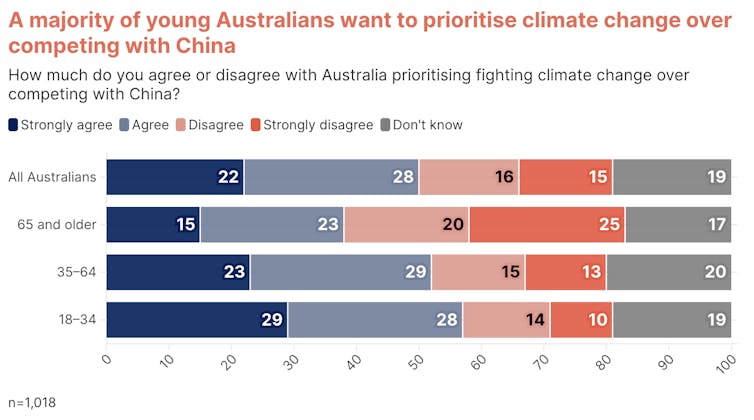New poll shows young Australians are wary of both AUKUS and the US – and want more action on climate instead
- Written by Ava Kalinauskas, Research Associate, United States Studies Centre, University of Sydney

Prime Minister Anthony Albanese returned home from his official US visit with a belly full of sarsaparilla-braised short ribs[1] and a string of announcements under his belt.
Amid the glitz and glamour, the spotlight during the visit was on Australia’s critical minerals sector. Albanese and US President Joe Biden unveiled a multi-billion-dollar plan[2] to bolster Australia’s domestic minerals industry to address supply chain vulnerabilities and counter China’s market dominance.
Yet, while Albanese and Biden framed the investment as key to the future of an “innovation alliance[3]” between the two countries, a key benefit was lost in the messaging: its utility to clean energy technologies such as electric vehicles.
Both countries stand to gain from ensuring this momentum on climate-related issues continues. But publicly framing it as such is just as essential.
In fact, as the dust settles on Albanese’s visit, this kind of cooperation on climate change is what may prove vital to guaranteeing the relevance of the Australia-US alliance for generations to come.
Read more: As Albanese heads to Washington, what can he hope to bring home?[4]
What our polling found
In August, the United States Studies Centre polled over 1,000 Australians on the key issues concerning Australia’s relationship with the United States. The results[5], published today, reveal a generational divide in how Australians see their country’s closest ally.
Young Australians hold a far less rosy view of US behaviour in Asia than older Australians. Fewer than a quarter of those aged 18–34 agree the United States plays a helpful role in the region.
This cohort are also markedly less likely to say the US alliance makes Australia safer. And only a third of those aged 18–34 think the AUKUS pact is a good idea for Australia, compared to a strong majority (62%) of those over 65 years old.
Read more: With AUKUS, Australia has wedded itself to a risky US policy on China – and turned a deaf ear to the region[6]
So, why does support for the so-called “unbreakable alliance[7]” splinter among young people?
Whether obliquely or directly, initiatives like AUKUS are driven by the strategic needs of the growing competition between the US and China.
Australian officials regularly speak of deterring aggression in the region and responding alongside the US and “like-minded” partners to “coercive unilateral actions”. This is a thinly veiled swipe at Beijing’s growing assertiveness and regional ambitions.
But this China-centric alliance agenda is unlikely to resonate with young people. For them, another priority is front of mind: climate change.
Our polling finds a majority of young Australians (57%) think their country should prioritise fighting climate change over competing with China. And compared to older Australians, those aged 18-34 are twice as likely to “strongly agree” with doing so.
Keeping climate on the public agenda
There have been some steps in this direction. In May, Albanese and Biden said climate would be a critical component of the Australia-US relationship, joining decades of defence and economic cooperation as the “third pillar” of the alliance. The two leaders then agreed on a compact[12] that pledged to bolster climate innovation and investment hand in hand.
Of course, addressing climate change also remains pragmatic from a geostrategic perspective.
Delivering on the principles of the compact – along with Australia’s joint bid[13] to host the global climate talks known as COP31 and its recent re-joining of the UN-backed Green Climate Fund[14] – will be vital to demonstrating our commitment to climate action, particularly with our Pacific neighbours.
Read more: Australia and the US are firm friends on defence – now let's turn that into world-beating climate action[15]
With China recently marking the tenth anniversary of its Belt and Road Initiative, there is growing pressure to deliver on these climate initiatives and infrastructure in the Pacific. This is also an important opportunity to provide a distinct values-based alternative to Beijing’s infrastructure deals.
The announcements from Albanese’s state visit are among the first positive steps towards translating the compact’s lofty ambitions into concrete action. But they must not be the last.
Both Albanese and Biden would do well to ensure that climate remains firmly on the agenda. Young people’s support for the alliance depends on it.
References
- ^ sarsaparilla-braised short ribs (www.washingtonpost.com)
- ^ multi-billion-dollar plan (www.pm.gov.au)
- ^ innovation alliance (www.whitehouse.gov)
- ^ As Albanese heads to Washington, what can he hope to bring home? (theconversation.com)
- ^ results (www.ussc.edu.au)
- ^ With AUKUS, Australia has wedded itself to a risky US policy on China – and turned a deaf ear to the region (theconversation.com)
- ^ unbreakable alliance (2017-2021.state.gov)
- ^ era of global boiling (news.un.org)
- ^ hottest global month on record (www.theguardian.com)
- ^ costliest bushfire season (theconversation.com)
- ^ unprecedented (www.theguardian.com)
- ^ agreed on a compact (www.pm.gov.au)
- ^ joint bid (www.theguardian.com)
- ^ re-joining of the UN-backed Green Climate Fund (www.abc.net.au)
- ^ Australia and the US are firm friends on defence – now let's turn that into world-beating climate action (theconversation.com)
















